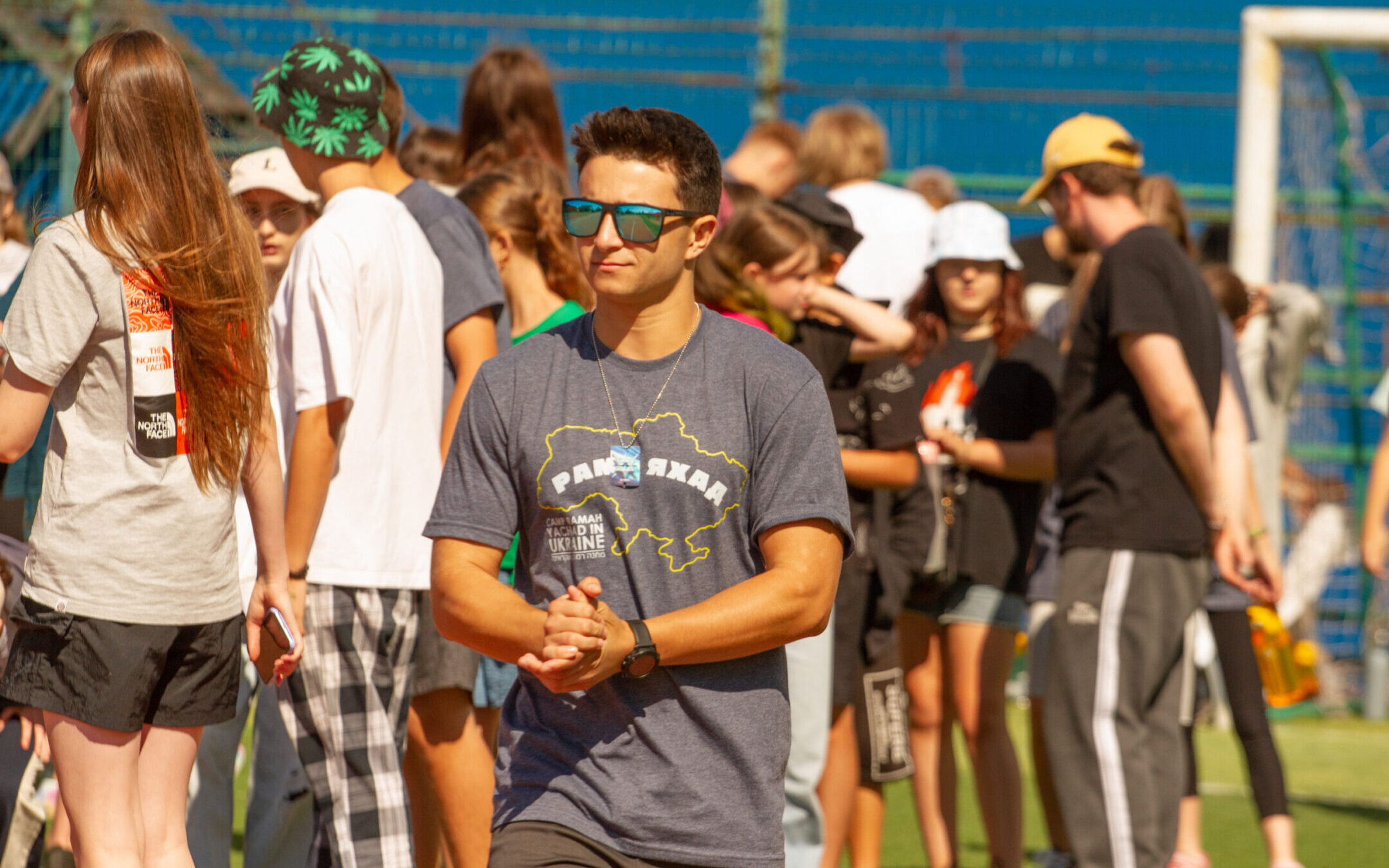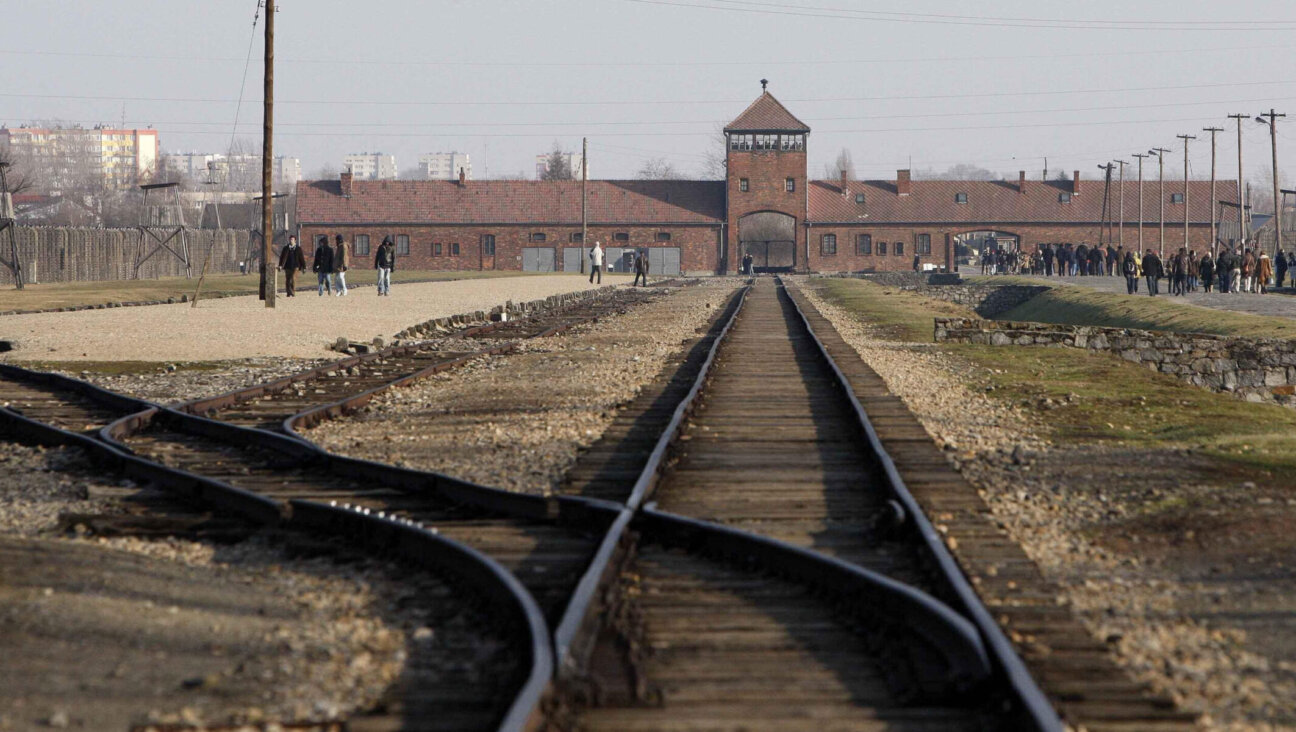At Camp Ramah in Ukraine, sports and Jewish traditions are an escape from war
This year, fewer Ukrainian men came to camp, to avoid forced conscription. A teen from Chicago volunteered instead

Ariel Oberfeld, 17, traveled from his home in suburban Chicago to work as a counselor at Ramah Yachad in Ukraine in 2024. (Courtesy Midreshet Schechter)
(JTA) — Ariel Oberfeld spent his childhood summers at a Jewish overnight camp in Wisconsin. This summer, the 17-year-old traveled further afield, to teach sports at Ramah Yachad, a Jewish camp in Ukraine holding its third session since Russia’s invasion.
Oberfeld, who lives in Deerfield, Illinois, has parents who immigrated from Ukraine in the 1980s. That bond with the country and his love for Jewish camp drove Oberfeld to travel into a warzone to give Ukrainian campers an experience as meaningful as his own.
“Last year I raised money for the camp, enough for two kids to go and participate,” he told the Jewish Telegraphic Agency. “This year, I didn’t want to just raise more money. I wanted to actually come and experience it firsthand.”
Ramah Yachad Ukraine has operated for 32 years, notwithstanding a 30th anniversary in Romania, when the camp was forced to relocate months after Russia invaded Ukraine in February 2022. It’s part of a global network of Ramah summer camps affiliated with the Conservative movement of Judaism.
A record number of 165 campers between the ages of 10 and 17 traveled across the country, many braving areas under bombardment, to arrive at camp on July 24. The two-week program, nestled in the western Chernivtsi region, offered a reprieve from a war that has wreaked havoc on the lives of 7 million children.
After morning prayers and classes, the campers had a choice of activities ranging from sports to arts, dance and cooking. Sports took center stage this year, as Ramah Yachad’s new collaboration with Maccabi — a global Jewish sports organization — brought 20 campers from Maccabi Ukraine.
The initiative was led by Arnie Fielkow, vice president of Maccabi USA. Last year, he started with bringing seven Ukrainian teenagers to Camp Ramah in Northern California. The success of the program, along with help from donors, allowed him to send 16 Ukrainian youth to the California camp and 20 to Ramah Ukraine this year. Maccabi also purchased sports equipment for both camps.
Before the project with Ramah, Fielkow was already involved in fundraising and advocating for Ukraine. He adopted two daughters from the country in 2007, both now college students in the United States. His youngest daughter, Svetlana, joined him on a visit to Ramah Yachad Ukraine in August.
Fielkow is also a devoted alum of Camp Ramah in Wisconsin. If not for the trip to Ukraine, he would have attended his 50th reunion this summer, he told JTA.
“Ramah meant a lot to me — it still means a lot to me — because I grew up in a small city in Wisconsin with not a lot of Jewish people, and my Ramah connection each summer was really my connection to the Jewish world,” said Fielkow.
As part of the Maccabi collaboration, Ramah Yachad hosted its first “Maccabiah,” a sports day with all the campers competing for prizes. Oberfeld helped plan the activities, including relay races, hula hooping and ballgames.
Ramah Yachad had a new wave of challenges this year, said the camp’s director, Rabbi Irina Gritsevskaya, who leads the Masorti movement’s operations in Ukraine from her home in Israel. After more than two years of Russian strikes on Ukraine’s basic infrastructure, the country has lost 60% of its power generation and faces the worst rolling blackouts since the start of the invasion. For every activity at camp, Gritsevskaya made back-up plans in case the electricity was knocked out.
Another difficulty came with Ukraine’s new sweeping drive to mobilize soldiers. Recent measures passed by President Volodymyr Zelensky lowered the conscription age from 27 to 25, required men of serving age to register on an electronic database and imposed harsher penalties for draft evasion. Some fathers of campers at Ramah Yachad, hiding from conscription squads, chose not to drop off or pick up their children. There were also fewer men working in the camp this year.
The fear reverberating around conscriptions became clear to Oberfeld during the camp’s disco night, when he noticed that another staff member was not dancing.
“I said, ‘What’s up, let’s go dance,’” said Oberfeld. “He said that his mood was destroyed because his friend just got taken off the streets to go serve in the army. That was a come-back-to-life moment.”
Chernivtsi, where Ramah Yachad takes place, is one of the relatively safest parts of the country. But many of the campers come from regions under constant bombardment, said Gritsevskaya, and many are refugees from territories now occupied by Russia. It’s common that the campers have lost loved ones. The bombings in their home cities continued while camp was in session, as July saw Ukraine’s heaviest civilian casualties since October 2022.
On top of the violence and terror, Ukrainian children have lost years of education and watched their families plunge into poverty. The total rupture of their daily lives has made it difficult to join with Jewish community and practice Jewish traditions. At camp, Oberfeld was moved by their interest in learning about being Jewish — which also meant learning about themselves.
“If they can’t practice being Jewish back home, then here they can learn about themselves — their Judaism — and pass on the traditions that they learn here to their kids,” said Oberfeld. “It’s truly meaningful to see that and motivates me to want to pass on the traditions that I know as well, even though I’m so young.”
Ramah Yachad kept a psychologist on site to support the campers. But according to Gritsevskaya, just playing sports outside was a form of therapy.
“We have many kids with post-traumatic stress and we are trying to leave it behind, to create two weeks of a balloon, a safe place where they can really have a happy childhood,” said Gritsevskaya. “Ariel is teaching sports for younger kids, and that’s the only opportunity for some of them, maybe once a year, to go out just to play football.”
A message from our Publisher & CEO Rachel Fishman Feddersen

I hope you appreciated this article. Before you go, I’d like to ask you to please support the Forward’s award-winning, nonprofit journalism so that we can be prepared for whatever news 2025 brings.
At a time when other newsrooms are closing or cutting back, the Forward has removed its paywall and invested additional resources to report on the ground from Israel and around the U.S. on the impact of the war, rising antisemitism and polarized discourse.
Readers like you make it all possible. Support our work by becoming a Forward Member and connect with our journalism and your community.
— Rachel Fishman Feddersen, Publisher and CEO





















